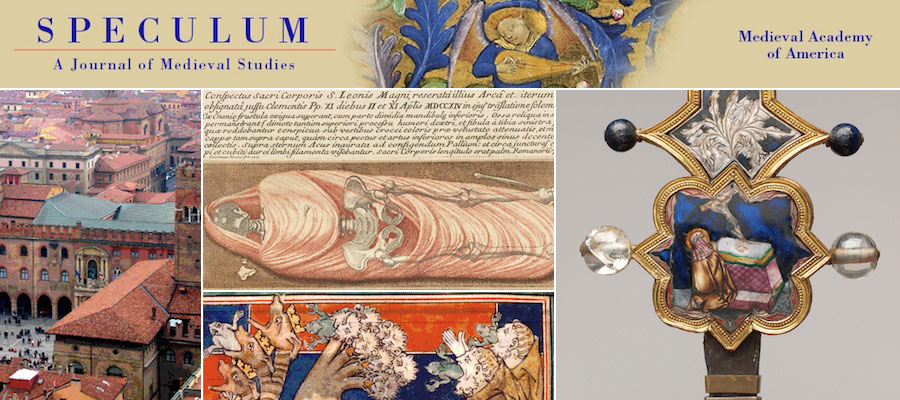The Medieval Academy of America seeks to appoint an Editor for Speculum. The position is configured as part-time, requiring around 25 hours per week. The Editor is appointed for an expected five-year term, subject to acceptable yearly performance reviews, with the possibility of a second five-year term by mutual agreement. The editor should be an established scholar with academic credentials in some field(s) of medieval studies, broadly defined, with good organizational and decision-making skills. Experience in journal or book editing will be helpful but not necessary. The new editor should plan on taking office in the late Spring of 2019, and at the latest by July 1, 2019. Terms and conditions are to be negotiated, as is the physical location of the Editor.
Speculum, published quarterly since 1926, was the first scholarly journal in North America devoted exclusively to the Middle Ages. It remains the premier journal for all fields devoted to study of the western Middle Ages, a period ranging from approximately 500 to 1500 CE. Presently, the journal has been expanding its range of topics and methodologies, and has extended its geographic reach; it has added a review editor for scholarly work with a digital component, and recently published a supplemental issue concerning medieval scholarship in the digital humanities. Speculum forms the intellectual center of the Medieval Academy of America, and editing the journal to an unfailingly high standard is challenging and absorbing. The main challenge for a journal representing such an enormously diverse field is to publish articles that make substantive contributions to their particular areas of expertise while yet appealing to the wide range of scholarly and disciplinary interests in the Middle Ages. The editor will be charged with final responsibility for peer review and with acceptance of manuscripts and book reviews for publication.
Under the exemplary editorship of Sarah Spence, who has decided to step down, the journal now produces 4 (long) numbers a year; it is published on time, with a brief turnaround for submitted articles as well. During the tenure of Dr. Spence, the submission rate has doubled, and as a result the pace of the work for the editor is intense. The new Editor will need to be a person who can sustain both the on-time publication of the journal and the rapid turn-around time for would-be authors. It falls to the Editor to assign prospective articles to at least two readers, to follow up with those readers when they are late, to reassign the pieces when the readers fail to produce a report, and, finally, to make the decision on each and every submission. Review editors assign the reviews and then fact check them. Reviews are edited by the assistant editor (presently the post-doc) and the copy editor, but then are read through by the Editor of Speculum, who may edit further.
In order to maintain both the present level of productivity and the highest standard of quality, the Editor must be a medievalist trained to a high level of scholarship and must be able to work to deadlines, under intense pressure, and without procrastination. S/he needs to be comfortable with the magnitude of the job, including the great numbers of submissions, as well as the importance and reach of the journal, which is premier in the field of Medieval Studies. Careful attention to detail is fundamental, especially in regard to proofreading, and to the supervision of others who aid in this task. Commitment to expanding the journal, in terms of topics, methodologies, and the range of authors, while retaining a strong core of work in western European medieval scholarship, is also important. The Editor must thus be able to strike a healthy balance between continuing current production and emphases and also shaping the future of the journal. The development and editing of supplementary issues of the journal and the occasional special issue contribute to this expanding range of disciplinary subjects and methodologies.
S/he needs a willingness to work collegially with authors. Increased submissions have meant a decreased acceptance rate. It is crucial for the Editor to have strong people skills in dealing with rejected authors in a professional manner, taking proper care of their feelings, all the while holding to the standards of excellence long expected from scholarship that appears in Speculum. The Editor must be skilled in maintaining confidentiality surrounding materials submitted, published, and rejected. S/he must know, or be interested in knowing, a wide range of medievalists, both to serve as readers and on editorial boards.
The Editor of Speculum chairs two boards, an Editorial Board for the journal and a Board of Review Editors; dealing with them in a collegial and professional manner is crucial. S/he also works consistently with the publisher of the journal, the University of Chicago Press, maintaining contact with specific people in various offices at the Press and promoting strong communication between the journal and its publisher. The Editor must be able to work comfortably with the online submission management system, Editorial Manager. S/he must be able to keep careful archives of accepted articles. At present there is also a post-doc assisting the Editor (2017-2019) and this position may well continue in the future. If this is the case, the Editor will chair the search committee for this position.
It is expected that the Editor of Speculum will attend meetings, talks, and conferences where representation of the journal is important, and a small travel fund is provided by the MAA for this purpose. The Editor also has expenses paid for the annual meeting of the MAA and for the International Medieval Congress at Kalamazoo.
